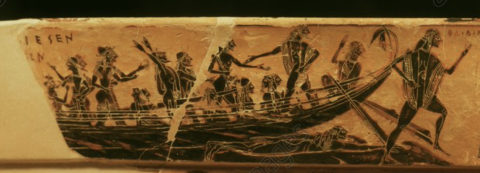ἄρα, well then, really
Λάτμιος, –α, –ον , of Mt. Latmos
ἄντρον, τό, a cave
ἀλύσκω, usually to run away, look for an escape, take refuge but see notes.
οἶος, -η, -ον, alone
περιδαίομαι, to blaze with love for
Ἐνδυμίων, ὁ, Endymion beloved of the Moon
ἦ, truly (emphasizes what follows)
θαμά, often
κίω, to go, go away
κύων, κυνός, ὁ or ἡ, dog
δόλιος, -α, -ον, and -ος, -ον, crafty, deceitful, treacherous
ἀοιδή, ἡ, song, a singing
μιμνήσκω, μνήσω, ἔμνησα, remind, remember
φιλότης, -ητος, love, friendship
σκότ-ιος, α, ον, dark 60
φαρμάσσω, to treat by using drugs
εὔκηλος, ον free from care, at one's ease
τεύχω, τεύξω, ἔτευξα, τέτευχα, τέτυγμαι, ἐτύχθην, build
δῆθεν, really, in very truth
μείρομαι, to receive as one's portion
ἄτη, -ης, ἡ, blindness, destruction
ἀνιᾱρός, ά, όν, grievous, troublesome, annoying
πῆμα, πήματος, τό, suffering, misery, calamity, woe, bane
δαίμων, δαίμονος, ὁ/ἡ, divinity, god, spirit
ἀλγῐνόεις, εσσα, εν, painful, grievous
τλάω, to bear, suffer, undergo
ἔμπης, alike, in any case, all the same
πινυτός, -ή -όν, wise, prudent, discreet, understanding65
πολύστονος, ον, much-sighing, mournful
ἄλγος, -ους, τό, pain
ἀείρω, to lift, heave, raise up
αἶψα, forthwith, at once, directly
ἐγκονέω, to be quick and active, make haste, hasten
ἀσπάσιος, α, ον, welcome, gladly welcomed
ὄχθη, ἡ, a riverbank, dyke
ἐπαίρω, to lift up and set on
ἀντιπέρην, the opposite coast
λεύσσω, to look
σέλας, αος, τό, a bright flame, blaze, light
ἀέθλος, -ου, ὁ, contest
παννύχιος, all night long
ἥρως, ἥρωος, ὁ, hero, warrior
ἐυφροσύνη, ἡ, mirth, gladness.
δαίω, to light up, make to burn, kindle
ὀξύς -εῖα -ύ, sharp,70
κνέφᾰς, τό, darkness, evening dusk, twilight
ὄρθιος, α, ον, high-pitched, shrill
φωνή, -ῆς, ἡ, voice
πέραθεν from beyond, from the far side
ἠπύω, to call to, call on, call
Φρόντις, ὁ, Phrontis (an Argonaut)
ἑός, ἑή, ἑόν, his, her, own
κασίγνητος, ό, a brother
ὄψ, ὀπός, ἡ, a voice
Αἰσονίδης, ὁ, son of Aeson, i.e. Jason
τεκμαίρομαι, to recognize
σῖγα, silently
ἑταῖρος, -ου, ὁ, comrade, companion
θαμβέω, to be astounded, amazed
εὖτε, when, after
νοέω, νοοῦμαι, --- --- --- --- perceive, observe, think
ἐτήτυμος, ον, true
ἀναύω, to cry aloud 75
ὀτρύνω, urge on
ὅμιλος, -ου ὁ, crowd
ἀμοιβηδίς, alternately, in succession
ἀντιάχω, to cry aloud in reply
τέως, so long, meanwhile, the while
θοός, -ή, -όν, swift
ἐλαύνω, ἐλῶ, ἤλασα, ἐλήλακα, ἐλήλαμαι, ἐλάθην, to drive, set in motion
ἐρετμόν, τό, oar
πεῖσμα, ατος, τό, a ship's cable
ἤπειρος, -ου, ἡ, the land (as opp. to the sea)
περαῖος, α, ον, on the further side
κραιπνός, ή, όν, rapid, rushing
χέρσος, -ου, ἡ, dry land, land
ἵημι, ἥσω, ἧκα, εἷκα, εἷμαι, εἵθην, put in motion, let go, shoot; (mid.) hasten, rush
ὑψοῦ, aloft, on high 80
ἴκρια, τά, the half-decks
Ἄργος, ὁ, Argus (an Argonaut)
Φρίξος, ὁ, Phrixos (an Argonaut)
χαμάδις, to the ground, on the ground
θρῴσκω, to leap, spring
γόνυ, γόνατος, τό knee
ἀμφότερος, α, ον, both of two
περιέχω, περιέξω, (or περισχήσω), περιέσχον, περιέσχηκα, --- ---, grasp
ῥύομαι, to draw to oneself, protect
δῠσάμμορος, ον, most miserable
Αἰήτης, ὁ, Aeetes, father of Medea
ἀναφανδά, visibly, openly
μῆχος, -εος, τό, a means, expedient, remedy 85
ἱκάνω, come to, arrive at, reach
φεύγω, φεύξομαι, ἔφυγον, πέφευγα, --- ---, flee
ἐπιβαίνω, ἐπιβήσομαι, ἐπέβην, ἐπιβέβηκα, --- ---,+gen., get up on, mount; +dat., board
χρυσοῦς, -ῆ, -οῦν, golden, gold-inlaid
δέρος, το, skin, fleece
εὐνάω, to put to sleep
φρουρός, ὁ, a watcher, guard
ὄφις, ὄφεως, ὁ, a serpent, snake
ξεῖνος, -ου, ὁ, stranger, guest-friend, foreigner
τεός = σός, your
μῦθος, -ου ὁ, story, word
ἐπιίστωρ, -ορος, conscious of, accomplice in, witness to
ὑφίστημι, to place under; mid. to promise
ἑκάς, far off 90
ὁρμάω, ὁρμήσω, ὥρμησα, ὥρμηκα, ὥρμημαι, ὡρμήθην, urge on; start, rush
χῆτος, τό, want, need
κηδεμών, όνος, ὁ, one who is in charge
ὀνο(σ)τός, ή, όν despicable, vile
ἀεικής, ές, unseemly, shameful
ἐίσκω, to make like
ἀχεύω, grieving, sorrowing, mourning
φρήν, φρενός, ἡ, thinking-thing, heart, core
γηθέω, to rejoice
αἶψα, forthwith, at once, directly
ἦκα, slightly, a little, softly, gently
ἀναείρω, to lift up
προσπτύσσω, to embrace
θαρσύνω, to encourage, cheer
δαιμόνιος, α, ον, of or belonging to a δαίμων; miraculous, marvellous 95
Ὀλύμπιος, ον, Olympian
ὅρκιος, ον, belonging to an oath
ζῠγιος, α, ον, of or for the yoke
κουρίδιος, α, ον, wedded
ἐνίστημι, to put, set, place in
ἄκοιτις, ἡ, a spouse, wife
νοστέω, return home
αὐδάω, speak
παρασχεδόν, beside, near
ἀραρίσκω, fit on or together, join, fit with
σφεῖς, they 100
ἄλσος, εος, τό, a glade
ἀνώγω, bid, command
ἐλαύνω, ἐλῶ, ἤλασα, ἐλήλακα, ἐλήλαμαι, ἐλάθην, to drive, set in motion
αὐτοσχεδόν, near at hand, hand to hand
ὄφρα, so that, until
ἔτι, still, yet, besides, already
νύκτωρ, by night
κῶας, τό, a fleece
παρέξ, outside, before
νόος, ὁ, mind, perception
ἔνθα, there
ὁμοῦ, together, at once
ἔπος, -ους τό, word
πέλω, to be
ἐσσύμενος, hurrying, vehement, eager, impetuous
χθών, χθονός, ἡ, the earth, ground
ὠθέω, to thrust, push, shove, force onwards
ὀρυμαγδός, ὁ, a loud noise, din 105
ἐπείγω, ἐπείξομαι, ἤπειξα, ---, ἤπειγμαι, ἐπείχθην, press hard
ἐλάτη, ἡ, oar
ἀριστεύς, ὁ, the best man, hero
ἔμπαλιν, backwards, back
ἀίσσω, ---, ἤῑξα, ἀίξασκον, --- ,ἠίχθην, to launch oneself, dart, swoop
τείνω, τενῶ, ἔτεινα, τέτακα, τέταμαι, ἐτάθην, stretch
ἀμήχᾰνος, ον, dejected, without resource
θαρσύνω, to encourage, cheer
ἰσχάνω, to check, hinder
ἀσχαλάω, to be distressed, grieved

